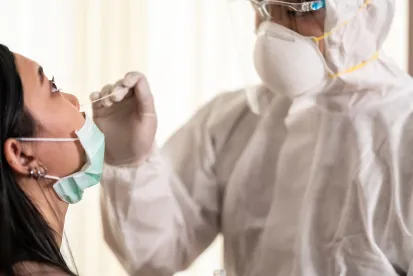California extended the time for eligible employees to use COVID-19 supplemental paid sick leave by three months, or until the end of 2022. In a further change, Assembly Bill 152 also allows California employers to require further COVID-19 testing as a condition of using this paid sick leave.
Extension of Sick Leave
Under legislation enacted earlier in 2022, California required employers with 26 or more employees to provide up to 80 hours of supplemental paid sick leave for certain COVID-related absences after January 1, 2022. This leave was in addition to any other paid sick leave that an employer otherwise had to provide under state law. Covered employers had to provide this COVID-19 supplemental paid sick leave until September 30, 2022. AB 152, which Governor Newsom signed on September 29, extended the availability of this paid leave until December 31, 2022.
AB 152 does not mandate additional COVID-19 supplemental paid sick leave for an eligible employee who previously used all or part of that leave while working for a particular employer. Nor does it change the reasons for which an employee may use such leave. Instead, the bill simply extended the deadline for an employee to use available COVID-19 supplemental paid sick leave. Employees hired by a covered employer after September 30 will become eligible for up to 80 hours of supplemental COVID-19 paid sick leave to use by the end of 2022 – the same as a new employee hired earlier in the year.
An eligible employee’s use of COVID-19 supplemental paid sick leave may extend beyond December 31, 2022, in some instances. As with the previous version of the law, an employee using this type of paid sick leave when the law expires must be allowed to take the full amount available as part of that absence.
Employers May Require Additional Testing
California’s 2022 COVID-19 supplemental paid sick leave law provided that a covered employer did not have to provide such leave if an employee refused to provide documentation of a test result. Those employers also could require an employee who tested positive to take another test five days or later after the first positive test, as well as to provide documentation of that result.
AB 152 clarified that a covered employer has no obligation to provide COVID-19 supplemental paid sick leave to an employee who refuses to take to these tests. The law also now allows an employer to require a second diagnostic test within 24 hours if the first diagnostic test is positive. These tests must be at no cost to an employee.
New Grant Program for Some Employers
AB 152 created a new grant program to assist certain employers with COVID-19 supplemental paid sick leave costs incurred during 2022. It established the California Small Business and Nonprofit COVID-19 Relief Grant Program within the Governor’s Office of Business and Economic Development. Among the requirements, eligible employers must have between 26 and 49 employees, started operating before June 1, 2021, and be currently active and operating. Grants may be up to $50,000 to cover actual costs.
Employer Takeaways
AB 152’s enactment means that covered employers in California must continue complying with the state’s COVID-19 supplemental paid sick leave mandates through the end of 2022. Those employers, however, may adjust their employee testing requirements in accordance with AB 152, as a condition of paying such sick leave going forward. Eligible smaller and nonprofit employers also may wish to explore applying for a state grant to cover COVID-19 supplemental paid sick leave costs.
In some places, California employers should be aware that local COVID-19 supplemental paid sick leave ordinances or similar requirements may still apply as well, such as in Oakland, Los Angeles, and Long Beach. In addition, on October 1, 2022, San Francisco’s Public Health Emergency Leave Ordinance (PHELO) took effect. Applying to employers with 100 or more employees worldwide, the ordinance allows an employer to credit California COVID-19 supplemental paid sick leave, which a San Francisco employee uses after September 30, 2022, against an employee’s PHELO allotment for 2022.



 />i
/>i

